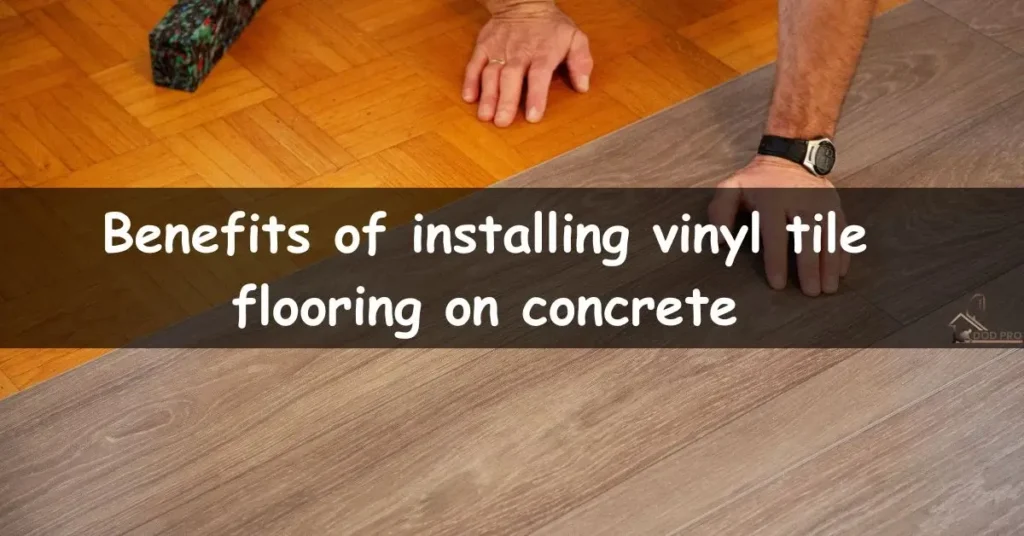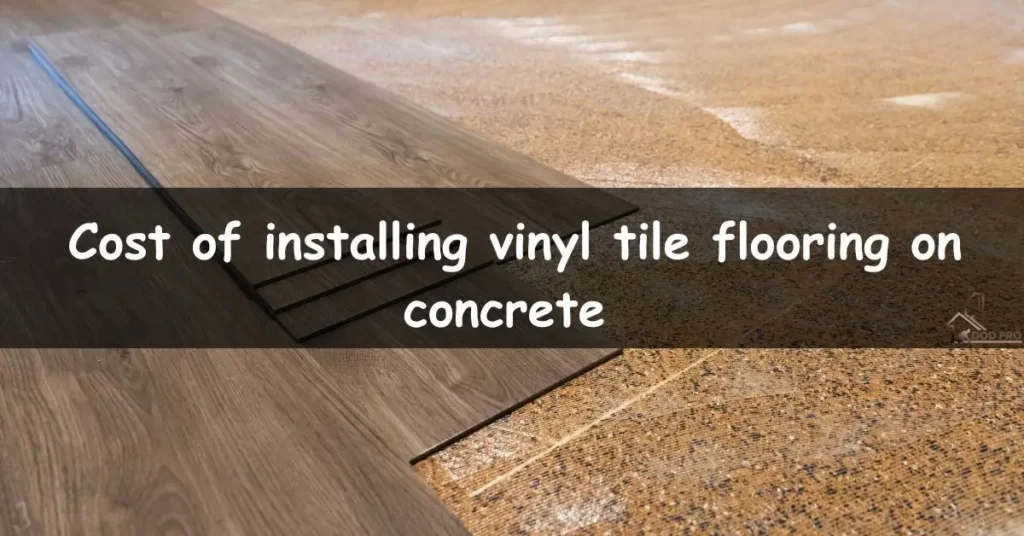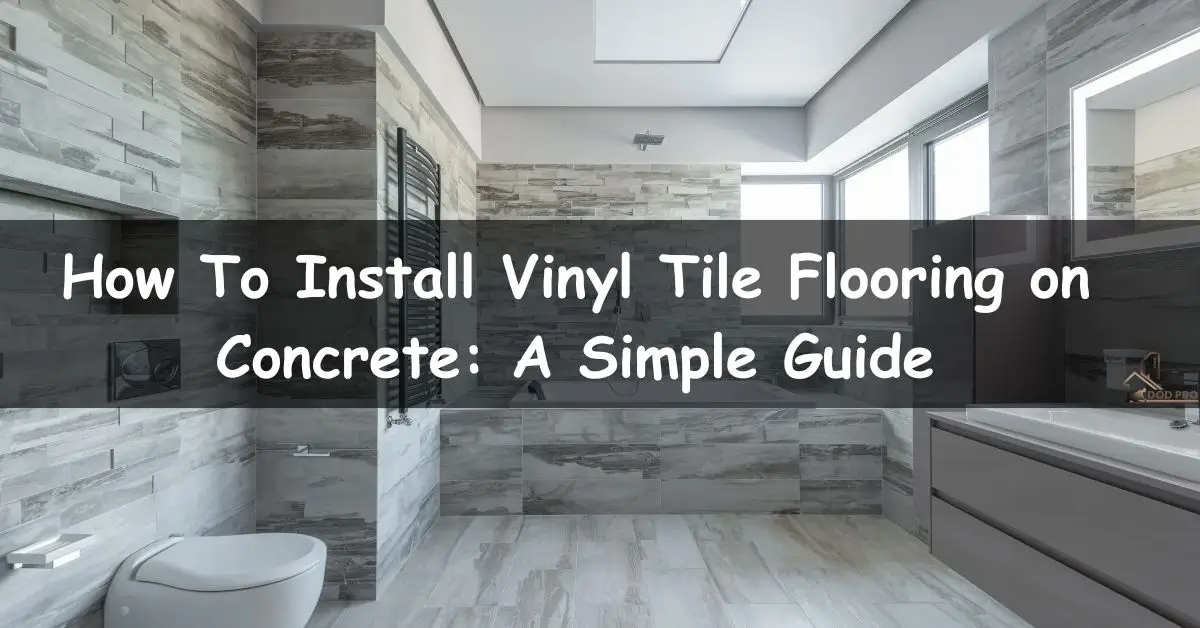Installing vinyl tile flooring on concrete is a great way to upgrade your space with a fresh and modern look. Vinyl tiles are affordable, easy to maintain, and perfect for basements, kitchens, or bathrooms. The process is simple and doesn’t require a lot of special tools, making it an ideal choice for DIY projects for beginners. This guide will tell you everything you need to know about installing vinyl tile flooring on concrete. So, Let’s dive in!
Can you install vinyl tile flooring on concrete?
Yes, you can install vinyl flooring tile on concrete surfaces. Vinyl is very popular among homeowners when installed on concrete due to its moisture resistance, durability, and easy installation. Methods such as click-lock, glue-down, or loose lay can be used. Still, a successful installation depends on proper preparation, such as cleaning the surface and repairing any cracks or moisture issues before the installation.
Can you install vinyl flooring over hardwood? Click here to read everything you need to know!
how to install vinyl tile flooring on concrete
Here are the steps for installing vinyl tile flooring on concrete. If you are DIY, use materials like vinyl tiles, measuring tape, utility knife, notched trowel, adhesive, roller, concrete cleaner and floor patching compound. Remember, better results come with good preparation.
Prepare the Concrete Floor:
Clean the concrete floor well. Sweep up dust and dirt, then use a cleaner to remove grease or oils. Let the floor dry. Check for cracks or holes and fill them with patching compound. If the floor is bumpy, use a levelling compound.
Measure and Plan the Layout:
Measure the area and dry lay the tiles to see how they fit. Start from the center of the room and work outwards to avoid small cuts at the edges.
Apply Adhesive:
For glue-down tiles, spread adhesive with a notched trowel. Apply only a small amount at a time. Peel off the backing for self-adhesive tiles and stick the tile to the floor.
Place the Tiles:
Start in the center of the room and press each tile firmly. Use a roller to press down and remove any air bubbles. Keep placing tiles until you reach the edges.
Cut Tiles for Edges:
Use a utility knife to measure and cut the tiles to fit against the walls or other obstacles.
Let It Set:
If using glue-down tiles, let the floor sit for 24 hours before walking on it. Self-adhesive tiles don’t need this waiting time.
Clean Up and Inspect:
Once the tiles are in place, clean up any leftover adhesive. Check the floor to ensure all the tiles are secure and there are no gaps.
Want to install underlayment for vinyl plank flooring? Click here for a complete guide
Benefits of installing vinyl tile flooring on concrete

Installing vinyl tile flooring on concrete has multiple benefits, making it a popular choice among homeowners and remodelers. Here are some of the popular benefits of installing vinyl tile flooring on concrete
Durability
Vinyl tiles are tough and resistant to scratches, dents, and stains, making them ideal for high-traffic areas like kitchens, living rooms, or hallways.
Water Resistance
Vinyl is water-resistant, perfect for basements, bathrooms, or laundry rooms where moisture is common.
Easy to Install
Many vinyl tiles have peel-and-stick backs or interlocking edges, making installation quick and simple without needing glue or grout.
Low Maintenance
Vinyl floors are easy to clean with regular sweeping or mopping and don’t require special maintenance or sealing.
Affordable
Vinyl offers the look of high-end materials like wood or stone at a fraction of the cost, with little upkeep needed.
Variety of Styles
Vinyl tiles come in many colors, patterns, and textures, including designs that mimic wood, stone, or marble.
Comfort
Vinyl is softer and warmer underfoot compared to hard flooring like tile or concrete, making it more comfortable for long periods of standing.
Noise cancellation
Vinyl helps reduce noise from foot traffic or dropped objects, making it great for multi-story homes or apartments.
Warm
Vinyl helps keep floors warmer, reducing the need for heating and making your space feel
cosier.
Aesthetic look
Vinyl tiles can hide cracks, stains, and imperfections in concrete, instantly improving the appearance of a room.
Vinyl tile flooring offers a practical and cost-effective solution for upgrading concrete floors.
Cost of installing vinyl tile flooring on concrete

The cost of installing vinyl tile flooring on concrete usually ranges from $3 to $10 per square foot, depending on the quality of the tiles and the installation process. Basic vinyl tiles typically cost between $1 and $3 per square foot. In contrast, higher-end options, like luxury vinyl, can range from $3 to $7 per square foot. Labour costs for installing the tiles usually add $1 to $3 per square foot. If the concrete floor needs cleaning, levelling, or moisture treatment, it could cost an extra $0.50 to $2 per square foot. Trim and transition pieces might add another $1 to $2 per square foot. Ultimately, the total cost depends on the materials and the work involved.
Remember, these costs are taken based on average, and your cost can go up or down depending on your needs.
Conclusion
Installing vinyl tile flooring on concrete is a smart and affordable way to improve your space. Vinyl tiles are durable, water-resistant, and easy to clean, making them great for kitchens, bathrooms, and basements. The installation is simple, especially for DIY projects, and there are many styles to choose from. Although the cost can vary depending on the quality of the tiles and any extra work needed, vinyl tile flooring is still a budget-friendly option whether you’re updating a room or renovating your entire home; vinyl tiles on concrete offer a stylish and practical solution that lasts.
FAQs:
How do I prepare the concrete floor before installing vinyl tiles?
A: Start by cleaning the concrete floor to remove dust and dirt. If any cracks or holes exist, fill them with concrete filler and let it dry. If the floor is uneven, use a levelling
compound to make it smooth. A clean, dry, and even floor helps the tiles stick better.
Q2: Do I need an underlayment for vinyl tile installation on concrete?
A: An underlayment isn’t always needed, but it can help if your floor isn’t perfectly smooth or you want less noise. If you’re using peel-and-stick vinyl tiles, you can apply them directly to clean concrete. Still, an underlayment can protect against moisture and make the floor more comfortable.
Q3: How long does installing vinyl tiles on a concrete floor take?
A: The time it takes to install vinyl tiles depends on the size of the area and your experience. It may take a day or two, including preparation for a small room. Larger areas may take longer. Make sure to give yourself enough time for the floor to be prepped properly and allow the tiles to set before walking on them.


